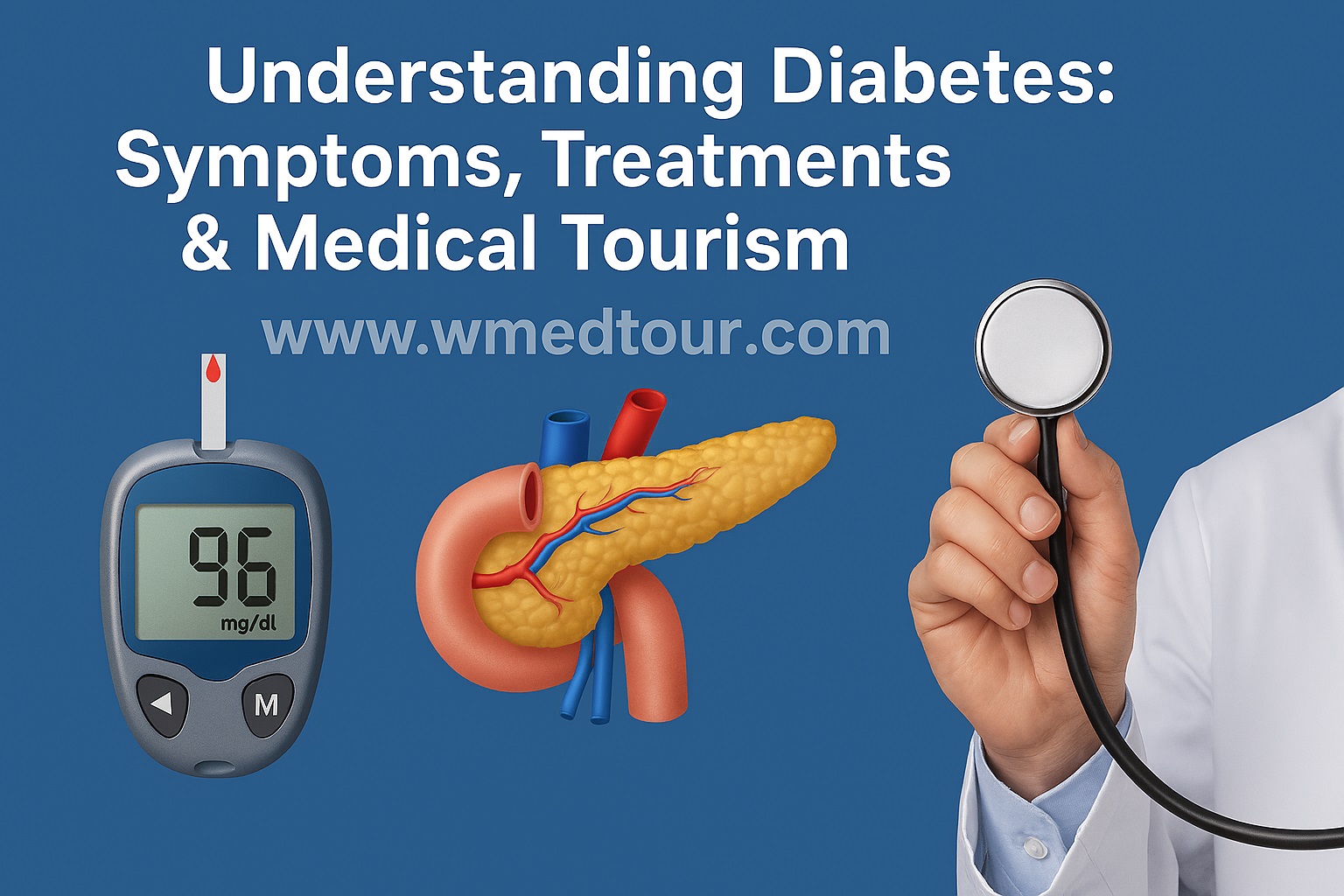Understanding Diabetes: Symptoms, Treatments & Medical Tourism
Living with diabetes presents significant challenges, both in terms of daily management and the potential for long-term health complications. However, understanding the disease and its various treatments is the first step toward living a full and healthy life. This comprehensive guide will explore the nuances of diabetes, shedding light on its early warning signs, effective management strategies, and the life-changing medical procedures available today. Furthermore, we will delve into the world of medical tourism, revealing how it can provide a viable and affordable path to high-quality diabetes care and treatment. Our goal is to empower you with the knowledge needed to make informed decisions about your health, ultimately helping you find the right path forward.
What is Diabetes? Understanding the Different Types
Broadly speaking, diabetes is a chronic health condition that affects how your body converts food into energy. In fact, most of the food you eat is broken down into sugar (glucose) and released into your bloodstream. Subsequently, your pancreas releases insulin, a hormone that acts as a key to let blood sugar into your body’s cells for use as energy. With diabetes, your body either doesn’t make enough insulin or can’t effectively use the insulin it makes. Consequently, this leads to an excess of sugar in your bloodstream, which can cause serious health problems over time. There are two main types: Type 1 and Type 2. Type 1 diabetes is an autoimmune disease where the body does not produce insulin, whereas Type 2 diabetes means the body does not use insulin properly.
Recognizing the Symptoms of Diabetes
Recognizing the symptoms of diabetes is absolutely critical for an early diagnosis. For example, some common signs include frequent urination, particularly at night, and increased thirst. Additionally, you might experience unexplained weight loss, blurred vision, or extreme fatigue. In fact, a slow-healing wound or frequent infections can also signal high blood sugar levels. Given these symptoms can be subtle at first, it’s very important to pay close attention to your body. If you notice any of these signs, seeking medical advice promptly is a crucial step. Early diagnosis can truly make all the difference in managing the disease and preventing future complications.
From Minor to Major: The Health Complications of Unmanaged Diabetes
Left unmanaged, high blood sugar can lead to a host of serious health complications. For instance, diabetes can affect your cardiac health, significantly increasing the risk of heart disease and stroke. Moreover, it can damage nerves throughout your body, a condition known as neuropathy, which often leads to pain, numbness, or tingling in the hands and feet. Other major concerns include kidney disease, which may require dialysis, and vision loss due to diabetic retinopathy. It is also important to consider the impact on oral health, as diabetes can lead to severe gum disease. Therefore, consistent monitoring and proactive management are not just recommended, they are essential.
Effective Treatments and Management Strategies
Fortunately, with the right approach, diabetes is a highly manageable condition. Treatment plans vary depending on the type and severity, but generally involve a combination of medication, lifestyle changes, and surgical interventions in some cases. People with Type 1 diabetes will always require insulin therapy, while those with Type 2 diabetes can sometimes manage their condition through diet, exercise, and oral medications. Additionally, for individuals with morbid obesity, bariatric surgery has been proven to significantly improve or even resolve Type 2 diabetes. Ultimately, working closely with healthcare professionals to create a personalized plan is key to achieving optimal results.
Surgical Solutions: A New Path to Remission
For many individuals living with Type 2 diabetes and obesity, surgical intervention offers a powerful new opportunity. Bariatric surgery, which includes procedures like gastric sleeve, gastric bypass, and gastric banding, works by changing the digestive system. As a result, this helps to achieve significant weight loss. What’s more, these surgeries often lead to a dramatic improvement in blood sugar control, frequently resulting in diabetes remission. This happens because the surgery affects gut hormones that regulate insulin production and blood sugar levels. If you are struggling with diabetes and weight, exploring surgical options might be the right choice for you.
Ready to Take Control of Your Health?
If you’re considering a surgical solution for diabetes or any other complex medical condition, we invite you to explore our services at Wmedtour.com. We specialize in providing world-class healthcare solutions at a fraction of the cost you would find at home. Our team of professional doctors and top hospitals are ready to guide you on your journey to better health. We offer a full range of medical tourism services. Ultimately, your health is our priority.
Bariatric Surgery Costs: A Global Comparison
When you are considering a major medical procedure like bariatric surgery, understanding the costs is vital. In many countries, the price of these procedures can be prohibitively high, which is why medical tourism has become a popular choice. The costs can vary dramatically based on the country, the hospital’s reputation, the surgeon’s expertise, and the specifics of the procedure itself. We have compiled a table with estimated costs to help you compare options in some of the most popular medical tourism destinations. This table is an excellent starting point for your research. In fact, it provides a clear picture of the potential savings you can realize by choosing to travel for your treatment. We believe in providing transparent pricing so you know exactly what to expect.
Estimated Costs for Bariatric Surgery in Popular Medical Tourism Destinations (USD)
| Country | Estimated Cost (USD) | Key Advantages |
|---|---|---|
| Iran | $4,000 – $6,000 | Offers incredibly competitive prices and boasts highly-skilled surgeons. |
| India | $6,000 – $10,000 | Known for JCI-accredited hospitals and a large number of English-speaking doctors. |
| Turkey | $8,000 – $12,000 | Combines world-class medical technology with a convenient location for travelers from Europe and Asia. |
As you can see, the financial savings are substantial. This allows you to invest in your health without the financial burden. Therefore, it’s wise to explore all your options and consult with a specialist. Our goal is to make these life-changing treatments accessible to everyone who needs them.
The Global Burden of Diabetes & Diabetes Statistics from the CDC
Diabetes is a global health crisis, affecting hundreds of millions of people worldwide. As a matter of fact, the World Health Organization estimates that diabetes was the ninth leading cause of death in 2019. For more detailed information, consider visiting authoritative sources such as the World Health Organization (WHO) and the Centers for Disease Control and Prevention (CDC). Furthermore, the American Diabetes Association (ADA) provides extensive resources on management and research. We also have expertise in other medical fields, including plastic surgery, dental services, and oncology, as unmanaged diabetes can impact all of these areas.
How to Plan for Medical Treatment as a Tourist
Planning for a medical journey can feel overwhelming, but a simple, step-by-step approach can simplify the process. Ultimately, it’s all about preparation. Our medical tourism services are designed to help you navigate this process smoothly. First and foremost, you should consult with your local doctor to confirm your diagnosis and treatment needs. This is a very important first step. Next, contact a trusted medical tourism facilitator like Wmedtour to receive a personalized consultation and a quote for your desired procedure. After that, you will send your medical records for a thorough review by our expert team. Once a treatment plan is created, we assist you with all the logistics, from visa applications to accommodation and airport transfers. This ensures a stress-free experience from start to finish. Finally, after the procedure, you can recover in comfort before returning home. Therefore, by planning ahead, you can receive the care you need without any complications.
FAQs About Diabetes & Medical Tourism
What is the difference between Type 1 and Type 2 diabetes?
Type 1 diabetes is an autoimmune disease where the body’s immune system mistakenly attacks and destroys the insulin-producing cells in the pancreas, leading to no insulin production. In contrast, Type 2 diabetes is a condition where the body either doesn’t produce enough insulin or can’t use it effectively, also known as insulin resistance. It’s the most common form of diabetes.
What are the long-term health complications of diabetes?
Uncontrolled diabetes can lead to severe health issues, including heart disease, kidney disease, vision loss, nerve damage (neuropathy), and a higher risk of infections. Managing your blood sugar is therefore crucial for preventing these complications. Moreover, it can also lead to complications requiring plastic surgery and dental care.
How does bariatric surgery treat Type 2 diabetes?
Bariatric surgery, like gastric bypass, helps to treat Type 2 diabetes by promoting significant weight loss and, more importantly, by altering the production of hormones in the gut that affect blood sugar levels. For many patients, this leads to a substantial reduction in the need for diabetes medication, or even full remission.
Why is medical tourism a good option for diabetes treatment?
Medical tourism is a great option because it provides access to high-quality, specialized treatments, such as bariatric surgery, at a much lower cost than in Western countries. This allows patients to receive life-changing care that might otherwise be unaffordable. For instance, countries like Iran and Turkey have excellent medical facilities and highly trained surgeons. Our professional doctors and top hospitals ensure that you receive the best care possible.
What factors influence the cost of diabetes treatment abroad?
The total cost of treatment, especially for a major procedure like bariatric surgery, is influenced by several factors. These include the country you choose, the specific type of procedure, the hospital’s prestige, the surgeon’s fees, and the length of your hospital stay. A medical tourism facilitator can help you understand all these costs clearly.
How can a medical tourism facilitator help me?
A medical tourism facilitator, such as Wmedtour, acts as a single point of contact for your entire journey. We help you find the right hospital and surgeon, manage all travel logistics, handle accommodation, and provide translation services to ensure a seamless and stress-free experience. Our goal is to make your medical journey as smooth as possible.
What is the recovery time for bariatric surgery?
Recovery time can vary, but most patients spend a few days in the hospital. The full recovery period at home can take several weeks, during which you will follow a specialized diet and exercise plan. Our team will provide you with a comprehensive recovery plan to ensure a successful outcome.
Can I travel with diabetes?
Yes, but it requires careful planning. You should pack extra medication, insulin, and blood glucose testing supplies. Additionally, you should consult with your doctor before traveling to discuss any necessary adjustments to your treatment plan, especially for time zone changes.
Are the doctors and hospitals reliable in medical tourism destinations?
Yes, many hospitals in popular medical tourism destinations have international accreditations, such as JCI (Joint Commission International), which ensures they meet stringent global standards of quality and patient safety. Furthermore, many surgeons are internationally trained and have extensive experience.
Can I get a bariatric surgery if I have other chronic diseases?
Yes, many patients with chronic conditions like heart disease or high blood pressure are candidates for bariatric surgery. The surgical team will carefully assess your overall health to minimize risks and ensure a successful procedure.
What is a good diet for a person with diabetes?
A balanced diet for someone with diabetes typically includes a mix of complex carbohydrates, lean proteins, and healthy fats. It is important to limit processed foods, sugary drinks, and saturated fats. A registered dietitian can provide a personalized meal plan to help manage blood sugar levels effectively.
How often should a person with diabetes check their blood sugar?
The frequency of blood sugar monitoring depends on the type of diabetes and the treatment plan. People with Type 1 diabetes and those on insulin typically need to check their blood sugar multiple times a day. Others may check less frequently. Your doctor will provide a personalized schedule.
Can diabetes be cured?
While there is currently no cure for Type 1 diabetes, it can be effectively managed with insulin therapy. Type 2 diabetes can go into remission, especially with significant weight loss from lifestyle changes or bariatric surgery. This means that blood sugar levels are within a normal range without the need for medication.
Is it safe to have surgery for diabetes abroad?
Yes, it can be very safe, provided you choose an accredited hospital and a reputable medical tourism facilitator like Wmedtour. These companies work with vetted hospitals and surgeons to ensure the highest standards of care and patient safety. We ensure that you receive the best care possible.
What is insulin resistance?
Insulin resistance is a condition in which the body’s cells do not respond effectively to insulin. As a result, the pancreas has to work harder to produce more insulin to help glucose enter the cells. Over time, this can lead to high blood sugar levels and the development of Type 2 diabetes.
How does obesity relate to Type 2 diabetes?
Obesity is a major risk factor for Type 2 diabetes. Excess fat, especially around the abdomen, can lead to insulin resistance. This makes it harder for the body to use insulin effectively to manage blood sugar, increasing the risk of developing the disease.
What are the warning signs of a diabetic emergency?
Diabetic emergencies include very high or very low blood sugar. Signs of dangerously low blood sugar (hypoglycemia) can include shakiness, dizziness, sweating, and confusion. Signs of high blood sugar (hyperglycemia) can include extreme thirst, frequent urination, and blurred vision. Both require immediate medical attention.
What is the role of exercise in managing diabetes?
Regular physical activity is an essential part of diabetes management. Exercise helps improve insulin sensitivity, meaning your body can use insulin more effectively. It also helps with weight management and improves overall cardiovascular health, which is especially important for those with diabetes.
How does medical tourism simplify the process of getting medical care?
A medical tourism facilitator simplifies the entire process by acting as a single point of contact. They assist with everything from finding the right doctor and hospital to handling travel logistics, accommodations, and providing a translator. This ensures a seamless experience for international patients.
What should I consider when choosing a medical tourism destination?
When choosing a destination, consider factors like the country’s reputation for medical care, the accreditations of the hospitals, the expertise of the surgeons, the cost of the procedure, and the overall travel and accommodation costs. It’s also wise to check the availability of translator services and post-operative care options.




